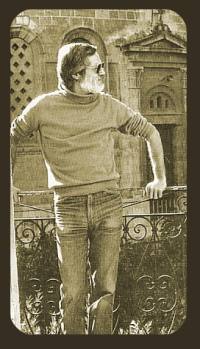 Edward Whittemore
on his balcony in Jerusalem
Edward Whittemore
on his balcony in Jerusalem
Photo by Helen Bar-Lev |
For
the comparitively few overseas publishers who visited
its book fair, there were projects to pursue - Most fairgoers-indeed,
most people in the local book trade were certainly not
aware that they were practically rubbing shoulders with
one of America's most unconventional, least classifiable
writers. No surprise that they did not, for he is also
one of America's least accessible, having elected quarters
in what must be the ultimate retreat: a balcony flat in
the compound of Jerusalem's Ethiopian Church, in a lemon
grove behind that curious 19th century church-in-the-round.,
his neighbors are the black-robed monks of a Christian
sect which sees itself linked to Judaism via the son of
King Solomon and Queen Sheba. The monks' uncommon tenant
is Edward Whittemore. Yale-educated, just turned 50, whose
first novel. Quin's Shanghai Circus (1974) was a Book-of-the-Month
alternate in the original Holt,. Rinehart and Winston
edition, a Popular Library paperback recently reissued
by Avon's Bard imprint, Whittemore has at various times
been compared to Vladimir Nabokov, Carlos Fuentes, Thomas
Pynchon. as well as to Lawrence Durrell of the Alexandria
Quartet, for he is a decade into his own Jerusalem Quartet;
actually the only thing that the two writers have in common
is the sun.
Three novels of
the quartet have been published so far by Holt: Sinai
Tapestry (1977). Jerusalem Poker (1978) and
the new Nile Shadows. of which PW's reviewer
said, "one of the most complex and ambitious espionage
stories ever written" Critics have called his books
"cosmic'" and "fabulous" (New York
Times) and have seen him as "one of the last. best
arguments against television" (Harper's). The Jerusalem
books can be read independently, although the main characters
reappear and the mood and intensity are maintained.
The fourth and
last novel of the series. which is now being written
in the Ethiopian compound will be called Bernini's Bag.
Some of it takes place in New York City. where Whittemore
has lived, some right in the Ethiopian compound where
PW's correspondent found the author.
Whittemore has lived
a good part of his life outside the United States - in
the Orient, in Greece and in ltaly; he came to Jerusalem
to be closer to his subject matter. But he makes a point
of keeping aloof from the local cultural scene, and his
closest contacts are in New York. With Tom Wallace until
he left Holt, now with his editor Judy Karasik there,
and with agent Lois Wallace. His writing days follow Israeli
office hours-8 AM-4 PM., sometimes six days a week; he
finds it convenient to respect the Shabbath week-end,
which begins Friday after lunch. Sunday morning, like
almost everybody else in Israel, he is back at his desk-like
almost everybody else in Israel except the Ethiopian monks
praying as they walk around their church and the French
nuns who sing like angels in their convent yard just across
the road.
© Herbert
R Lottman - Publishers Weekly June 1, 1983
|
